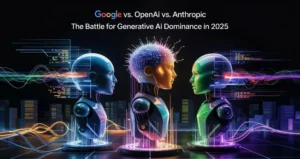Demis Hassabis, CEO of Google DeepMind, states that artificial intelligence may eliminate diseases and pave the way for unprecedented abundance.

Insights into Demis Hassabis and the Future of Artificial Intelligence
Demis Hassabis, the co-founder and CEO of Google DeepMind, is at the forefront of artificial intelligence (AI) innovation. After recently being honored with a Nobel Prize, he continues to explore the possibilities of AI, particularly in the pursuit of artificial general intelligence (AGI)—a human-like intellect with advanced capabilities. Let’s take a closer look at his journey, his views on AI’s rapid progress, and the groundbreaking technologies being developed at DeepMind.
A Passion for Understanding the World
Early Fascinations
From a young age, Hassabis was intrigued by life’s biggest questions, including the nature of consciousness and reality. He found inspiration from great scientists and philosophers, leading to his ambition to further human knowledge. For him, AI represents the ultimate tool for advancing this understanding.
AI’s Rapid Progress
In discussions reflecting on AI’s evolution, Hassabis pointed out that the field is advancing at an unprecedented speed. He believes that the combination of growing interest, investment, and talent is contributing to what he describes as an "exponential curve" of improvement in AI technologies.
The Rise of AI Companions
Introducing Astra
One of the extraordinary projects at DeepMind is Astra, an advanced chatbot capable of conversing, seeing, and interpreting visual information in real-time. Unlike older chatbots that relied strictly on text-based data, Astra processes images and provides insightful feedback, showcasing its understanding of art and emotions.
Interaction with Astra
During a demonstration, Astra correctly identified a range of artworks and described the emotions conveyed, even crafting stories based on the images shown. This versatile interaction illustrates a significant advancement in AI’s ability to engage meaningfully with users.
Unpredictable Learning and Development
Learning from Data
Hassabis noted that AI systems, including Astra, learn from diverse internet data to develop skills autonomously. Each system is trained to understand its environment, and the capabilities that emerge from this learning can sometimes surprise even their creators.
Concerns about AI’s Capabilities
The growing complexity of AI systems brings both excitement and concern. Hassabis acknowledges the duality of these technologies: while they can achieve remarkable feats, there is apprehension about how they learn and the potential consequences should this knowledge deviate from human values.
The Path Towards Artificial General Intelligence
DeepMind currently focuses on a model named Gemini, which aims to perform tasks like booking tickets and online shopping—an essential step toward AGI. Hassabis anticipates that we might see significant advancements in AGI in the next five to ten years, potentially leading to AI systems that understand daily life in nuanced ways.
Everyday Integration
DeepMind’s vision includes AI that works seamlessly within our daily lives, like a virtual assistant providing real-time insights during everyday activities. The goal is to create systems that not only assist but also empower users by thoroughly understanding their needs.
Advancements in Robotics
Hassabis also highlighted the potential breakthroughs in robotics. He anticipates that humanoid robots equipped with AI will soon perform various practical tasks, marking a significant evolution in autonomous machinery.
Complex Problem Solving
Recent demonstrations showcased a robot capable of understanding vague instructions and reasoning through tasks that would typically require human logic. This kind of innovation opens up new possibilities for robotic applications in various industries.
Enhancing Drug Development
Hassabis and his team have made strides in using AI to decode the complex structures of proteins, which are crucial to life itself. Traditional methods of studying these structures were slow, but with DeepMind’s AI, they can analyze millions of protein structures in a fraction of the time.
The Future of Health
This advancement could revolutionize drug development, significantly reducing the time and cost required to create new treatments. Hassabis believes that, with the help of AI, eradicating diseases may become a realistic goal within the next decade.
Challenges and Ethical Considerations
Despite the promising prospects of AI, Hassabis shared concerns about potential misuse and the ethical implications of increased autonomy in AI systems. He emphasizes the importance of responsible development, placing safeguards to ensure these technologies align with societal values and do not compromise safety.
Teaching Morality to AI
One intriguing aspect of the conversation revolved around the possibility of teaching AI systems morality. Hassabis believes it is achievable by demonstrating ethical behaviors and creating guidelines that would shape AI’s understanding of right and wrong.
As the race for AI dominance heats up, leaders like Hassabis push boundaries, knowing the implications of their work will shape many aspects of human life for years to come. In an age where technology continues to evolve at an incredible pace, the conversation around AI remains vital, addressing opportunities alongside responsibilities.






